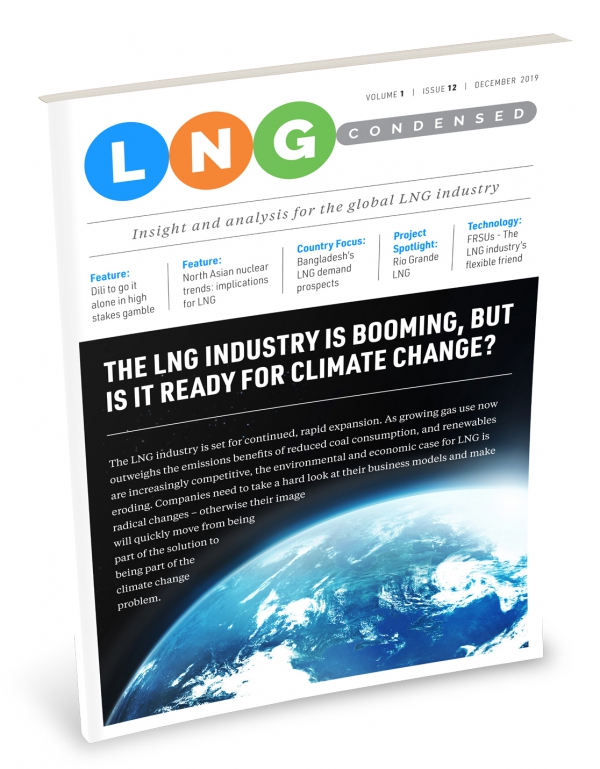[LNG Condensed] The LNG industry is booming, but is it ready for climate change?
Available Exclusively to NGW Subscribers:
Volume 1, Issue 12 - January 6, 2020
|
LNG Condensed brings you independent analysis of the LNG world's rapidly evolving markets.
Covering the length of the LNG value chain and the breadth of this global industry, it will inform, provoke and enrich your decision making. Published monthly, LNG Condensed provides original content on industry developments by the leading editorial team from Natural Gas World. LNG Condensed is your magazine for the fuel of the future. |
In this Issue:Editorial: Climate Resilience There were many major achievements for the LNG industry over the course of 2019. Final investment decisions were taken on a swathe of next generation LNG projects in Russia, Mozambique, Qatar and the US. Even Nigeria LNG’s long overdue expansion got the go-ahead. There was clear evidence of the LNG market’s growing maturity in the form of the steep rise in liquidity in futures contracts linked to S&P Platts JKM price assessment, while BP’s publication of its LNG trading terms and conditions should aid much-needed contract standardisation. The growth of portfolio players, more diverse pricing mechanisms and the gradual disappearance of destination restrictions all bode well for increased international LNG trade. The LNG industry is booming, but is it ready for climate change? The LNG industry is set for continued, rapid expansion. As growing gas use now outweighs the emissions benefits of reduced coal consumption, and renewables are increasingly competitive, the environmental and economic case for LNG is eroding. Companies need to take a hard look at their business models and make radical changes – otherwise their image will quickly move from being part of the solution to being part of the climate change problem. Dili to go it alone in high stakes gamble The government of Timor-Leste has bought out foreign partners in the planned Greater Sunrise project to ensure the scheme’s LNG plant is built on domestic soil, but raising the fi nance for development is unlikely to be easy. Meanwhile, gas is running out on the Bayu Undan field, on which Dili is heavily dependent for state income. North Asian nuclear trends: implications for LNG North Asia accounts for a quarter of operational nuclear capacity worldwide, and about two-fifths of the capacity under construction or planned. But the prospects for nuclear power in the region vary widely, as do the implications for LNG requirements. Country Focus: Bangladesh’s LNG demand prospects Bangladesh is a newcomer to the world of LNG, but promises to become a substantial market with imports reaching 30mn mt/yr by 2041. Yet it would be foolhardy to say this demand is set in stone. Actual consumption depends on an ambitious industrialisation strategy and infrastructure delivery in all areas which could both benefit and detract from LNG demand. Project Focus: Rio Grande LNG US company Next Decade could hit the headlines early in 2020 if, as billed, it takes a final investment decision (FID) on its Rio Grande LNG project, the largest of four US LNG plants to receive final approval in November from the US Federal Energy Regulatory Commission (Ferc). Rio Grande LNG is located at the relatively uncongested Brownsville deepwater port on the US Gulf Coast. Technology Focus: FRSUs - The LNG industry’s flexible friend The growing popularity of floating storage and regasification units (FSRUs) is an integral part of the LNG market’s increasing flexibility. |
|---|





